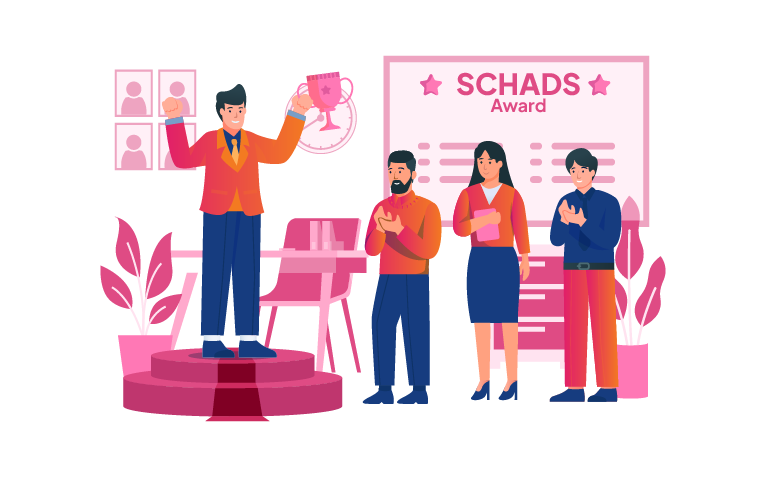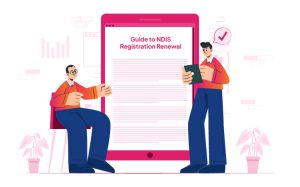13 May, 2025
SCHADS Award and Attracting Top Talent to the NDIS Sector
NDIS
6 min read

In Australia’s evolving disability support landscape, the demand for skilled and compassionate professionals has never been higher. As the National Disability Insurance Scheme (NDIS) continues to grow, providers are faced with a critical question: how do we attract and retain top-tier talent in a sector that demands both empathy and expertise?
A key part of the answer lies in the SCHADS Award.
Understanding the SCHADS Award
The Social, Community, Home Care and Disability Services Industry Award (SCHADS) sets the benchmark for fair pay and working conditions for disability support workers in Australia. It outlines minimum wages, shift lengths, allowances, overtime, and other entitlements, aiming to provide structure and equity across the care sector.
As of 1 July 2024, the Fair Work Commission approved a 3.75% increase in minimum award wages, positively impacting workers under the SCHADS Award. This change is more than just a number—it’s a step towards valuing the essential work carers provide every day.
The SCHADS Award is also structured in classification levels that recognise the varied experience, qualifications, and duties of support workers. It gives a clear pathway for professional development, something that resonates strongly with job seekers who are not only looking for work but for a career with purpose.
The NDIS Workforce: Challenges and Opportunities
According to the NDS Workforce Census 2024, the disability support sector employs 67,363 workers across 361 organisations. But with the growing number of participants in the NDIS—projected to reach 500,000 by 2024, the demand for qualified workers is set to surge to 353,000.
This presents a massive opportunity, but also a challenge: competition for skilled talent is fierce. High turnover rates, burnout, and a lack of career progression have traditionally been barriers to retention. The key to overcoming these challenges lies in understanding what workers truly value.
Leveraging the SCHADS Award to Attract Talent
To stand out in a competitive hiring market, NDIS providers must do more than offer jobs; they must offer rewarding careers. Here’s how the SCHADS Award can be used as a strategic advantage:
1. Transparent and Competitive Pay
A competitive salary is often the first factor that job seekers evaluate. Providers can use the clarity and fairness of the SCHADS wage structure as a strong selling point during recruitment. This award framework ensures that employees are fairly compensated for their qualifications and responsibilities, helping them feel financially valued for the essential services they provide.
Clearly communicating pay structures in job postings and during onboarding can build trust and reinforce the organisation’s commitment to fairness and transparency.
2. Promote Job Security and Stability
The SCHADS Award offers a structured approach to employment conditions, including clear guidelines on minimum shift lengths, break entitlements, and overtime. The introduction of a 2-hour minimum shift engagement ensures that part-time and casual workers aren’t underpaid for short shifts.
This kind of employment security can be particularly attractive in a sector known for its casualised workforce.
3. Invest in Growth and Recognition
Support workers often face limited career progression opportunities. The SCHADS Award allows organisations to create defined pathways for growth by aligning job roles with the award’s classification levels. For instance, progressing from a Level 2 to a Level 3 position may involve completing training or demonstrating leadership on the job.
Encouraging this growth and recognising accomplishments with formal promotions or title upgrades motivates staff to stay longer. This is especially powerful when combined with ongoing training, upskilling, and leadership development programs.
4. Work-Life Balance Through Smart Rostering
Managing rosters manually can lead to errors, inconsistencies, and burnout. SCHADS-compliant rostering is not only a legal requirement—it’s also a retention strategy. By implementing intelligent rostering systems like RotaWiz, providers can:
- Match staff availability with client needs
- Avoid scheduling conflicts and under/over-staffing
- Maintain accurate records for compliance
- Reduce last-minute cancellations
These features allow staff to plan their lives with confidence, which boosts morale and helps retain high-performing team members.
RotaWiz also provides mobile access, shift reminders, and real-time updates, ensuring carers always know when and where they are needed. This level of operational clarity significantly enhances worker satisfaction.
5. Recognition and Positive Workplace Culture
Support workers are more likely to stay when they feel their efforts are appreciated. According to the AIHW, 63% of NDIS participants aged 15–64 reported receiving the support they need to do their job, with satisfaction highest among those in inclusive and well-structured workplaces.
Employers should focus on building a strong workplace culture where good performance is acknowledged, achievements are celebrated, and mental health is supported. Regular team check-ins, peer recognition programs, and open feedback loops can all contribute to this goal.
Why Now Is the Time to Act
With labour shortages intensifying across Australia, providers that adopt a proactive approach to recruitment and retention will lead the sector. Embracing the SCHADS Award is more than ticking a box—it’s about building a system that prioritises fairness, support, and structure.
The SCHADS Award also helps employers compete not only with other NDIS providers but with adjacent sectors such as aged care, childcare, and hospitality. Many workers are seeking roles where they feel appreciated, can grow, and maintain a reasonable work-life balance. The disability support industry can provide this, but only when providers commit to ethical and forward-thinking workforce practices.
Aligning Pay and Career Value with National Averages
According to Jobs and Skills Australia, the average full-time earnings for community and personal service workers was approximately $1,350 per week (or around $70,200 per year) in 2023. Roles covered under the SCHADS Award—particularly those in disability support—closely align with or exceed this benchmark, especially for those working full-time hours at higher classification levels.
This alignment with national salary standards can be a compelling factor for job seekers comparing roles in and outside the care sector. When combined with benefits such as flexible work, purpose-driven missions, and strong job security, it positions NDIS providers as desirable employers.
End Note
Attracting top talent to the NDIS sector isn’t just about pay. It’s about respect, fairness, opportunity, and support. By championing the SCHADS Award and leveraging modern workforce tools, providers can not only meet growing demand but also elevate the standard of disability care across Australia.
The SCHADS Award offers structure. Smart systems like RotaWiz offer efficiency. Together, they build a solid foundation for workforce sustainability in the NDIS sector.
The path forward is clear: providers must prioritise worker wellbeing, transparent communication, and long-term development. Those who do will find themselves at the forefront of a more equitable and thriving disability support system.


